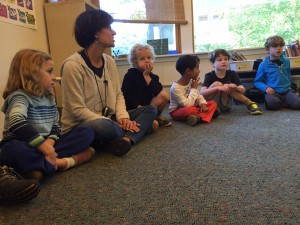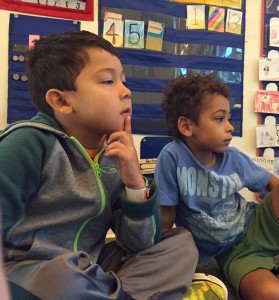The Slap Game
In the First Grade we play an all-class game that has come to be called The Slap Game. The set up and rules are very simple but always produces a lot of complexity both in thinking and in social interaction.

We are seated in a circle and I begin, without any preamble, “Slap Game, level 1 (or whichever level we are currently working), clockwise” and then do something. It is then up to the group to figure out what needs to happen next in order to avoid a teacher cry of “Scratch!”
The first thing that needed to be solved was what was meant by “clockwise.”
Pretty quickly someone came forward, literally, leaping into the center of the circle and began spinning around with his arm extended, “It is the way a clock goes, like this!” Many agreed and then another voice, “I think we are supposed to slap around the circle in a clockwise way.” The group generally seems to agree with this idea and we restart, “Slap Game level 1, clockwise.” The person to my clockwise side slaps, along with a smattering of others in the circle. “Scratch.” We begin again. Similar results. Children begin to call out corrections, sometimes in frustration.
Here is where the real work of the game begins. Children have to voice opinions and objections civilly. If you think you have discovered the rule to the level you must explain it to the players ahead of you, who, may or may not, act accordingly. This can be hard when you think you know the answer but need to wait in order to test it.
We also talk about the challenges of being the first person to go, particularly when you have little to no information to go on. When I say, “Slap Game level 7, counterclockwise. Yak! [slap]” the person on my counterclockwise side is really in the hot seat. After a couple of attempts I usually open it up to the group, “Does anyone have any thoughts as to what x might do in this situation?” As they rise through the levels, there is a lot of testing of ideas:
“Ben said scratch when you said Honey Badger. I think you have to slap and just say a basic animal not a special kind of animal, so like dog or bear.”
We test it, “Scratch!”
“We scratched on Megalodon. So I think it needs to be a real animal. I mean an animal that isn’t extinct. ”
Another test, “scratch.”
Someone tries shark instead of Megalodon “Scratch.”
A new voice, “It needs to be an animal that lives on the land!”
Another attempt, another scratch.
Then me, “Another good thought, but it didn’t get us any further. Any other ideas?”
And so it goes…
We often don’t solve the level in a single sitting. We set it all aside and come back to the challenge fresh.
This activity is always high interest for the children and allows us to practice so many important things:
– Seeing how other’s thinking both scaffolds and extends our own
– How to hold frustration
– How to react to others’ missteps or errors
– How to gently correct someone
– Testing hypotheses
– Thinking logically
The children are very excited to keep moving forward with this activity, especially since I’ve promised them that level 64 is a real doozy!
Ben
